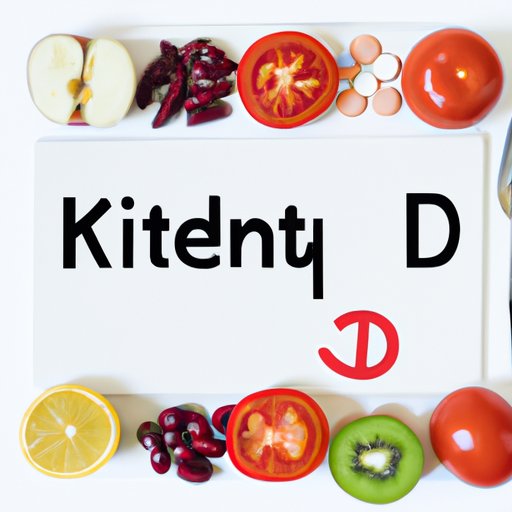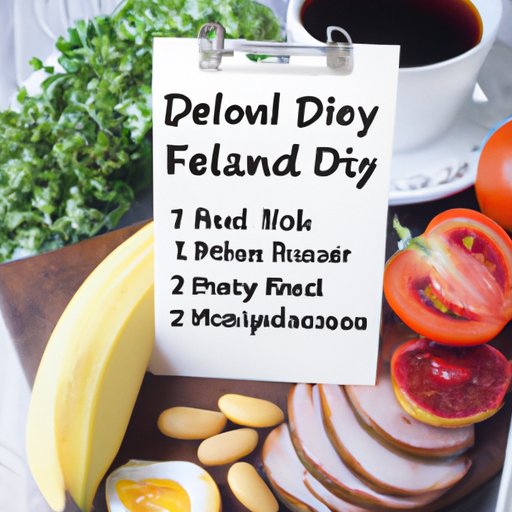
Introduction
If you have ever heard the term ‘renal diet’ and wondered what it means, you’re not alone. Renal diet is a type of diet that is prescribed specifically for individuals with kidney disease. It is designed to help manage the symptoms of kidney disease and to promote optimal kidney health. In this article, we will explore everything you need to know about renal diet, including its importance, basic principles, and how you can incorporate it into your daily life.
Renal Diet 101: Everything You Need to Know to Keep Your Kidneys Healthy
Before we dive into the details of renal diet, let’s define what it is. Renal diet is a specialized diet that is prescribed to individuals with kidney disease to help manage the symptoms and promote optimal kidney health. A renal diet is low in protein, sodium, phosphorus, and potassium and is designed to keep the body in balance.
A renal diet has numerous benefits, including:
- Reducing the workload on the kidneys
- Controlling blood pressure
- Preventing or delaying kidney failure
- Reducing the risk of heart disease
The basic principles of a renal diet include:
- Limiting protein intake
- Limiting sodium intake
- Limiting phosphorus intake
- Limiting potassium intake
Some examples of food groups that are included in a renal diet are:
- Fruits and vegetables
- Low-sodium meats and poultry
- Low-fat dairy products
- Grains and cereals
Eating to Protect Your Kidneys: The Ins and Outs of a Renal Diet
Now that we know what a renal diet is and its benefits, let’s discuss why it is important to manage your diet for kidney health. The kidneys are responsible for filtering waste products from the blood. When the kidneys are not functioning properly, waste products can build up in the body and cause various health problems.
People with kidney disease need to pay close attention to their nutritional requirements. A renal diet can help manage the symptoms of kidney disease and prevent further damage to the kidneys. When planning a renal diet, there are several factors to consider:
- Proper hydration
- Limiting sodium intake to control blood pressure
- Limiting protein intake to reduce the workload on the kidneys
- Limiting phosphorus intake to prevent bone loss and calcification
- Limiting potassium intake to reduce the risk of hyperkalemia
A poorly managed diet can have a negative impact on kidney health. For example, a diet that is high in sodium can cause high blood pressure, which can damage the kidneys over time. A diet that is high in protein can increase the workload on the kidneys, leading to further damage.
Managing Kidney Disease with Diet: A Guide to Renal Nutrition
Kidney disease is a condition in which the kidneys are not functioning properly. When the kidneys fail, waste products build up in the body, which can cause a range of health problems. Renal diet plays an important role in managing kidney disease and preventing further damage to the kidneys.
There are several dietary restrictions and limitations for individuals with kidney disease. Some of these include:
- Limiting protein intake to reduce the workload on the kidneys
- Limiting sodium intake to control blood pressure
- Limiting phosphorus intake to prevent bone loss and calcification
- Limiting potassium intake to reduce the risk of hyperkalemia
- Avoiding foods that are high in saturated and trans fats
Managing a renal diet while dealing with kidney disease can be challenging. Here are some tips and tricks to help make it easier:
- Read food labels to check for sodium, potassium, and phosphorus content
- Plan meals in advance
- Cook at home to control the amount of sodium and other nutrients in your food
- Choose low-sodium seasonings and condiments
- Avoid processed foods
- Take your medications as prescribed
The Importance of a Renal Diet: Maximizing Kidney Health Through What You Eat
Now that we have a better understanding of renal diet and how it relates to kidney health and disease, let’s discuss the factors that contribute to kidney health. The kidneys are vital organs that filter waste products from the blood, regulate blood pressure, and produce hormones that contribute to bone health and red blood cell production.
Nutrition plays a critical role in kidney function. A well-balanced diet that is low in sodium, phosphorus, and potassium and moderate in protein can promote optimal kidney health. Some of the beneficial components of a renal diet include:
- Lean protein
- Fruits and vegetables
- Low-fat dairy products
- Low-sodium grains and cereals
Following a renal diet has long-term benefits, including:
- Delaying the onset of kidney disease
- Slowing the progression of kidney disease
- Reducing the risk of heart disease
- Improving overall health and well-being

Renal Diet: Foods to Enjoy and Avoid for Optimal Kidney Function
Now that we know the benefits of renal diet and the factors to consider when planning a renal diet, let’s take a closer look at the foods to enjoy and avoid for optimal kidney function.
Recommended foods for a renal diet include:
- Fruits low in potassium, such as apples, blueberries, and strawberries
- Vegetables low in potassium, such as green beans, lettuce, and cauliflower
- Low-sodium meat and poultry, such as chicken and turkey breast
- Low-fat dairy products, such as skim milk and low-fat cheese
- Grains and cereals, such as rice, pasta, and bread
- Healthy fats, such as olive oil, avocado, and nuts
Foods to avoid or limit on a renal diet include:
- Fruits and vegetables high in potassium, such as bananas, oranges, and tomatoes
- Processed foods, such as canned soups and frozen dinners
- Foods high in sodium, such as chips, crackers, and fast food
- Foods high in phosphorus, such as dairy products, nuts, and beans
- Foods high in saturated and trans fats, such as fried foods and fatty meats
It’s important to note that some foods, such as dairy products and nuts, can be high in both phosphorus and potassium. If you have kidney disease, it’s important to talk to your healthcare provider or a registered dietitian about your dietary restrictions and limitations.
Eating Your Way to Kidney Health: How a Renal Diet Can Help Prevent and Treat Kidney Disease
As we have learned, a renal diet can play a critical role in preventing and treating kidney disease. Here are some ways that a renal diet can help:
- Preventing or delaying kidney failure
- Reducing the workload on the kidneys
- Maintaining a healthy blood pressure
- Reducing the risk of heart disease
- Improving overall health and well-being
It’s important to note that incorporating a renal diet into your daily life can be challenging. Here are some tips for making it easier:
- Plan meals in advance
- Cook at home to control the amount of sodium and other nutrients in your food
- Choose low-sodium seasonings and condiments
- Avoid processed foods
- Take your medications as prescribed
Finally, it’s important to seek medical advice when planning a renal diet. A registered dietitian or healthcare provider can help you create a personalized renal diet that meets your nutritional needs while also managing your kidney disease.
Conclusion
In conclusion, a renal diet is a specialized diet that is prescribed to individuals with kidney disease to help manage the symptoms and promote optimal kidney health. A renal diet is low in protein, sodium, phosphorus, and potassium and is designed to keep the body in balance. By following a renal diet, individuals can delay the onset of kidney disease, slow the progression of kidney disease, reduce the risk of heart disease, and improve overall health and well-being. It’s important to incorporate a renal diet into your daily life and seek medical advice when planning a renal diet to ensure that it meets your nutritional needs and manages your kidney disease.




